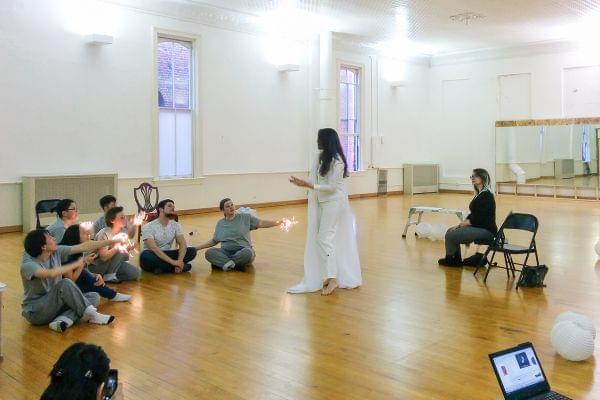New Theater Piece Provides A Glimpse Into The Quantum World

Illinois physics professor Gina Lorenz, center, playing a quantum sage, uses poetry to explain concepts of light in the interdisciplinary performance piece “Quantum Voyages.” It was created by Illinois physics professor Smitha Vishveshwara and theatre professor Latrelle Bright to offer a look at basic concepts of quantum physics. Courtesy of Smitha Vishveshwara
The interdisciplinary theater piece "Quantum Voyages" takes audience members on a journey to strange atomic landscapes. The performance debuts today as part of the 80th birthday celebration of Nobel Prize-winning physicist Anthony Leggett.
Two University of Illinois professors created the piece: Smitha Vishveshwara, who teaches physics, and Latrelle Bright, who teaches theater.
Bright says theater is a great platform for conveying the wonder of science to a lay audience.
“How can we tell the stories of science so that people aren’t so afraid of it?" Bright said. "Because I know I was afraid of it. But I’m also fascinated by it at the same time. So how can we tell that story better? And theater is just one way, one entry way for people who might not read it in a textbook, but might come see the show.”
Tonight's debut is at 7:30 p.m. at the I Hotel in Champaign. A second performance will take place at 7:30 p.m. on Wednesday, April 4, at the University of Illinois' Beckman Institute. Both performances are open to the public.
Hear the full interview with the creators of “Quantum Voyages” on SoundCloud:
The following is a transcript of a portion of the interview with the creators of "Quantum Voyages":
Christine Herman: "Quantum Voyages" is an interdisciplinary piece created by the two of you. What was the idea behind it?
Smitha Vishveshwara: First off, the quantum world is strange, mysterious and fascinating and somehow begs to be depicted as a sort of epic journey. This is what we do: we study these different worlds, different lands. And it's all about stories. Somehow it seemed natural, it lends itself to a story that could come alive through a voyage.
Latrelle Bright: As a person who's been doing theater for a very long time, I love traditional theater, but I also do work that's called devised, which is creating new work with a group of people from scratch. And there's something about dramatizing information that really appeals to me: How can we tell the stories of science so that people aren't so afraid of it? Because I know I was afraid of physics. But I'm also fascinated by it at the same time. So, how can we tell that story better. And theater is just one way, one entryway for people who might not read it in a textbook, but might come see the show and understand a little bit better.
And I think one of the points of accessibility is the parallel in which, in learning about the quantum world, we are also learning about how we coexist on this planet as fellow human beings. How we interact with one another, how we repel, compel, impel, all of those things.
Vishveshwara: Yes, and there are distinct parallels also with the relationship of the individual with itself, as well as with the community that it lives with. Condensed matter physics, in fact, really deals with how the individual coexists with other individuals, and what is the collective behavior that emerges. And this is also something that we can depict within a community, and we very much do in our "Quantum Voyage" piece.
Herman: I want to ask a little bit about the story. There are two voyagers in this piece: Terra, who represents Earth, and Akash, who represents sky, and they sent out to gather knowledge about the quantum world. What kinds of challenges do they face?
Vishveshwara: Challenges of the physical quantum world, and challenges of being together on a voyage.
Bright: Challenges of two people in a room as well, absolutely.
Vishveshwara: And that's what makes it a wonderful adventure story -- the fact that there are all these different quantum landscapes. And Sapienza, the guiding force, in a sense was inspired by parallels that you see in epic tales or fairytales or the like. The spirit of knowledge as a guiding force is pretty common also in what we undergo in our own walks of life, that you have some sort of guiding spirit that takes you through these worlds.
Bright: And navigating this world together with other human beings, with other ways of doing things, whether flights of fancy or systematic methodology, and how they can complement one another as well.
Vishveshwara: And this is important both in doing science - there's all kinds of different temperaments, and each one is equally important for discoveries to take place. But it's also, I think, a statement on the way we can coexist as a society and bring forth things in harmony, that you have to absolutely work together and respect each other's traits.
Follow Christine on Twitter: @CTHerman

